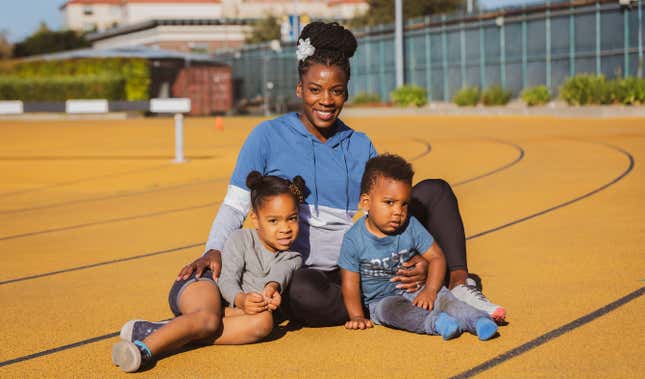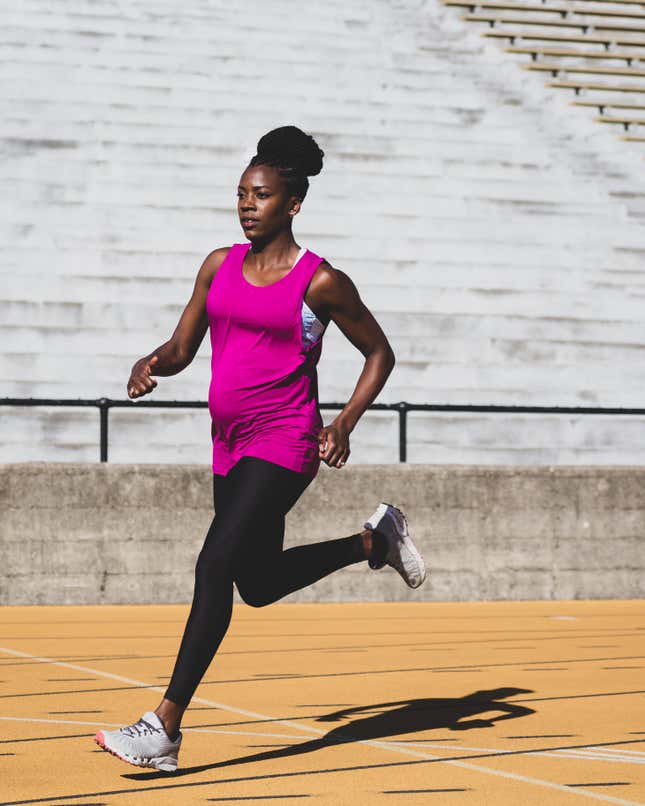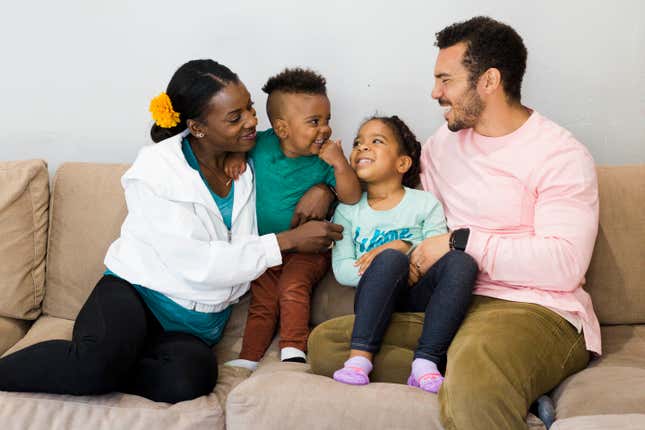
“The marathon continues” may have been Nipsey Hussle’s signature line (may he rest in peace), but it is equally applicable to champion American middle-distance runner and fellow 2019 Root 100 honoree Alysia Montaño. One of the most decorated women in track and field, Montaño began shifting paradigms in the sport in 2014, when she competed in the 800-meter race at the US Track and Field Championships while 34 weeks pregnant. It was a feat she’d repeat in 2017, while pregnant with her second child.
As the seven-time U.S. 800-meter champion and Olympian told The Glow Up in October, competing while pregnant wasn’t just due to her dedication to her sport, but a statement on the biases and restrictions female athletes often face.
“This is what it looks for a woman in my career to decide to have a family and career,” she explained. “But also, I want to be that voice and that platform for all those women that are not able to have their voices heard, [saying] ‘We’ve got this’…Every pregnancy is different, but let us choose how we are going to move and feel empowered in our pregnancies and with our own bodies.”
“If we’re talking about supporting women in sports, then we need to support the possibility—all the possibilities,” she later added.

At the time of our conversation, the renowned runner, now pregnant with her third child, had just returned from the 2019 World Athletics Championships in Doha, Qatar, a contest dominated by black female athletes who also happen to be mothers. Runners Allyson Felix, Nia Ali, and Shelly-Ann Fraser (also known as “Mama Rocket”) all turned in tremendous performances, disproving the commonly held assumption that motherhood and athleticism don’t mix.
But Montaño wasn’t in Doha to compete this year. After prolonged investigations, the Olympian was awarded two overdue bronze medals for races she’d run in the 2011 and 2013 World Championships, stripped from Russian runner Mariya Savinova, who was found guilty of doping and banned for life by the International Olympic Committee after being awarded gold (2011) and silver (2013) medals (h/t CBS News).
“I have—and continue to have—a lot of mixed emotions,” Montaño admitted, noting that in total, she’s due five medals as a result of the doping scandal. “It goes beyond just my battle; this has been a systemic problem from the International Athletics Association Federation (IAAF), and it was time for their corruptness to be exposed.”
As of late, Montaño has become well-known for calling out corrupt practices in competitive women’s sports. It was Mother’s Day of this year when she upended the world of sports sponsorships, writing a New York Times op-ed calling out former sponsors Nike and Asics for punishing female athletes who decide to become mothers. Her article, titled “Nike Told Me to Dream Crazy, Until I Wanted a Baby,” instantly went viral. The discussions it prompted eventually compelled Nike and several other major sports brands to amend contract stipulations and performance requirements, after Montaño revealed them to be tantamount to equating pregnancy with an injury, casting the expectant mothers on its roster of athletes as liabilities.
Perhaps most disturbing was how machiavellian pro-woman, often pro-motherhood campaigns like Nike’s seemed in contrast to policies that made no space for female athletes to evolve by making families part of their trajectories; plans Montaño had yet to make at 21 years old when signing her Nike contract.
“You’re coming out of college, and they’re offering you a contract, and you’re like, ‘Wow, I’ve seen your ads, and yes, you’re all about [advocating for women]!” the now-33-year-old Montaño recalls. “And then, when you’re in it, you’re like ‘Whoa, you guys are liars…you don’t care. You don’t care about the athlete, you don’t care about the individual, and you damn sure don’t care about women....you damn sure don’t care about black women, I can 100 percent tell you that.”
While Montaño hadn’t previously considered herself an activist, Nike’s—and subsequent sponsor Asics’—punitive practices regarding pregnancy and postpartum were her breaking point in a profession she considered to not only be failing the women in its ranks but guilty of perpetuating seemingly race-based disparities in its sponsorship deals. Montaño recalled learning white women with accolades mirroring her own sometimes being paid twice as much in sponsorship money. By her own accounting, she has lost out on hundreds of thousands of dollars, if not over a million in endorsements by being sidelined.
“That’s part of the NDAs they have us sign; they include all these discriminatory factors, but say ‘don’t tell anybody what’s in these contracts’ because then we can’t fight for our rights,” she told us.
And an activist was born.
“[W]hat I’ve come to recognize is, it had to happen to me this way…because I was going to be the one who was going to fight for us,” she said.
While still under contract with Nike, she’d written an email to corporate expressing her concerns, that read, in part: “You won’t support my next steps within my life, and part of that is motherhood.”
“I’m human, and I wanted my opportunity to live a full life and to have choices—for myself, my body, my next steps,” she explained. “I feel like that’s what life is, and it just seemed like they were [censoring] all of that growth, especially when it came to governing my body as a woman athlete.”
When Nike wouldn’t budge, Montaño left for Asics, encouraged by the support she found from the female executive in charge of her contract. After signing, Montaño became pregnant with her first child, and was assured it was a non-issue; a moment that taught her the importance of having women in decision-making roles. While 2014 was a down year for her competitively, when the woman advocating for Montaño resigned, she was replaced by two men who instantly wanted to reduce the expectant mother’s contract based on her performance.
Despite not only meeting but surpassing the criteria Asics’ new team required for her to receive her initial contract amount, Montaño’s frustration grew as even minor issues, like asking for a uniform shirt with more coverage for her postpartum body, became unnecessary difficulties.
“I was just like, ‘Screw you guys. I mean, where do I go from here?” she recalled. “You recognize, ‘Wow, this is an industry-wide problem.’ They are not open to women with careers and family...They want us to pick sports or motherhood, and they don’t want the two to mix. And I’d had enough.”
Feeling like she had a target on her head at Asics, all Montaño knew is that she and her husband wanted to have three kids in quick succession—and a sponsor who would accommodate that along with her ongoing career.
“I decided with my husband, ‘I’m going to be honest [about wanting another child],” she told us. “I didn’t want to be afraid of having that conversation; it made me feel so dead to be knowing who I was and what I wanted for my life and to be moving with a company that might not appreciate that. And I just decided right then and there that if they don’t want that, then I don’t want to be with them, either.”

After leaving Asics, she also didn’t want to remain silent. Following prolonged discussions with fellow female athletes and New York Times writer Lindsey Crouse, Montaño was encouraged to go public with her experiences.
“That’s why we need women at the table,” she said. “I am so lucky that she believed in my story.”
Crouse wasn’t the only one who believed Montaño’s story; amid an outpouring of support, several brands came to the table to prove they could do things differently—and one stood out. New Zealand-based maternity-focused activewear brand Cadenshae’s tagline is “Supporting the community of mothers.” Intrigued by the opportunity to work with a brand intended for active mothers, Montaño—who hadn’t yet disclosed that she was pregnant with her third child—found theirs a message even brands offering more lucrative contracts couldn’t compete with.
“It was such a symbiotic conversation that [Cadenshae and I] had; it was so in line with one another’s goals and missions. It was truly about bigger impact; it was truly about making it bigger than myself,” she shared. “Cadenshae was one hundred percent [saying], ‘We want to support you in your motherhood, to be able to be the mom that you want to be, and we want you to be the activist, the community leader and the athlete you need to be…The morals, the values were so in line with Cadenshae, and they did everything they could to make sure this was gonna be a relationship where we both would benefit.”
Cadenshae owner and founder Nikki Clarke echoed Montaño’s sentiments, sharing that it was empathy for Montaño’s work-life conflict that compelled her to reach out.
“I’m captivated by her plight and have followed Alysia’s story since the get-go. The more it went on, the more I knew I had to get in touch with her,” said Clarke in a press release from the brand. “After our first meeting, I wanted nothing more than to support her on her quest…not only as a female professional athlete, but as a spokeswoman for maternity rights throughout the US and globally.”
With a mission to not only clothe active expectant and nursing mothers but to champion maternity-based issues and equal rights, Cadenshae’s approach to their first sponsored athlete is holistic—in fact, the brand isn’t requiring Montaño to be an athlete at all.
“If Alysia chooses to run again we will support her fully, but it is not 100% the focus of our partnership,” said Clarke. “We want to be able to help Alysia continue her campaign for change. That’s what matters to us. We’re so excited to see what the future holds.”
While Montaño is grateful for the time to focus fully on motherhood when she gives birth early next year, she also hopes to transform the sport she loves. Amended contracts are nice, but she’s fighting for a cultural shift.
“I’d love to be able to come back and compete again, but I don’t want that at the forefront. Right now, the way that the running profession is, it’s a dead-in-the-water profession...what we’re seeing right now is that it’s one that’s rewarding dopers over clean athletes; it’s one that’s penalizing women athletes…And I if I can do nothing more—or nothing less—I want to make sure that I am moving the needle for future generations...I need to keep pushing, and I want to be with a company that’s going to help me do that.”
Montaño’s first initiative with Cadenshae is the creation of a foundation and support hub to provide “a one-stop-shop” of resources for mothers, including their rights in the workplace, where to find support, and space for women to share their stories and find empathy.
“I don’t want a woman [who wants to have kids] to look back and say, ‘I couldn’t, because my career…and now, I wish I would have,’” said Montaño. “We need there to be resources for us, and we need to have a space where the greater population can come—our men too, our allies—can come and say, ‘Okay, this is what I need to be doing better.’”
So, does Montaño consider herself an activist now?
“I think that we should all be activists,” she said. “I had no background in activism…but I am a black woman [and a] mother. If I’m not being an activist, I’m being complicit to all the BS that’s happening right now. That’s the way I see it.”
“I feel like this relationship with Cadenshae is going to change the world, I really do,” she added. “I know with our common mission, our common goal, that there’s going to be an incredible impact that can lead to a greater good.”

